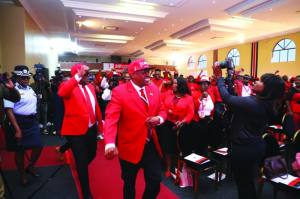On January 23, 2022, Lesedi, a 30-year-old Motswana woman, was detained and arrested at the Hazrat Shahjalal International Airport in Dhaka, Bangladesh.
After receiving an anonymous tip, the airport customs officials intercepted Lesedi after she flew in from South Africa via Doha, Qatar. When questioned, she reportedly denied having any illegal substances or items to declare.
The airport officials proceeded to search her luggage and claimed to have found over 3kg of a heroin-like substance in her luggage. These are the facts and not much else is certain beyond them. As of November 27, some media reports claimed she was sentenced to death and executed, and others, corroborated by her father, claim that she is still awaiting trial.
Mis- and disinformation on Facebook is rife, with people posting and resharing videos of what they claim is Lesedi’s lifeless body being wheeled out of a hospital room, alleging that she was swayed by the “high life” of international travel, or that she had a boyfriend who tricked her into drug trafficking.
With little verifiable information to go by, so many of the important questions have been left unanswered. If she is still alive, where is she being detained? Is she being afforded legal representation? And, most importantly, what has the High Commission of Botswana in India (which also represents Botswana in South Asia at large) and, by extension, the Botswana government, done to establish the facts and support her as a citizen facing the death penalty in a foreign country with a history of unaccountable state violence?
Let’s begin with what we do know. On November 27, Lesedi’s father, Goitsemodimo Molapisi gave a televised interview to Newzroom Afrika, detailing his version of events. At the time the interview was given, rumours of Lesedi’s execution already began circulating. “It’s a very difficult time for [our family]”, senior Molapisi begins. “These people [presumably the Bangladeshi authorities and local media] are not doing the right thing. We just see them posting very bad news about our daughter”.
The Molapisi family resides in Shakawe village in the north west district of Botswana. According to Molapisi, Lesedi was unemployed and eager for any opportunity to earn a living. Without informing her father, she had left home on January 15. The news of her arrest eight days later was the first time he had heard of her whereabouts since.
Molapisi says Lesedi never contacted him directly after her arrest, but instead received a call from people claiming to be lawyers and demanding a large payment for their support. Suspicious of this, he declined and was eventually contacted by an African “association” based in Bangladesh. The association informed him that they secured his daughter legal representation. This lawyer is also apparently serving as an intermediary, delivering messages between father and his daughter. Molapisi then says that her daughter only appeared in court “for mention”, the purpose of which is to determine how the defendant pleads.
When asked about his daughter’s reaction to her arrest, Molapisi says she didn’t have a clue about the drugs purported to be in her luggage. Adding another layer of mystery, Molapisi found a letter written to the Bangladeshi High Commission in Pretoria, South Africa, which allegedly asked for Lesedi to be granted a visa to enter the country and purchase ready-made garments. The writer of that letter, Molapisi says, is a person named Amir Hossain, senior consultant of a Dhaka-based company called PMT Tours & Travels.
The letter, Molapisi believes, is an indication that his daughter may have been tricked into an international drug trafficking scheme. However, for a Muslim-majority country such as Bangladesh, “Amir Hossain” is a common name, even belonging to a deceased judge of the Bangladeshi Supreme Court.
In addition, a quick Google search elicits no results for a company named “PMT Tours & Travels” based in Bangladesh, let alone Dhaka. Nevertheless, the prospect of travelling abroad and earning money, albeit a questionable one, could be enticing enough for an unemployed young woman from a district and country where over a third of the population lives in poverty and are unemployed, respectively.
Molapisi says he was assured assistance from the Ministry of Foreign Affairs. After months of waiting, he contacted them again; “the feedback they gave me is that they are still looking for official information regarding the arrest of my daughter”.
He ends the interview by saying that that is all he knows. Regardless of the circumstances that led to his daughter’s arrest, the situation Molapisi finds himself in - remote, distant, helpless, and uninformed - would be devastating to any concerned parent. Even though this is also a matter of public concern, the government of Botswana has remained silent.
The Botswana Centre for Human Rights, also known as Ditshwanelo, released a statement on November 25, claiming to be “in the process of communicating” with the government and citing the Bangladeshi authority’s silence around Lesedi’s arrest as an international human rights infringement. Indeed, it is.
The Vienna Convention on Consular Relations, ratified by both Bangladesh and Botswana, regulates the roles and functions of consulates across UN member states. Article 36 of the Convention stipulates that arrested foreigners must be informed of their right to contact their home State’s consular office and that any consular office have the right to “correspond with and arrange legal representation” for their national. If indeed Lesedi has been executed by the Bangladeshi authorities, they are obligated to inform the nearest Botswana consulate or High Commission. However, the Convention isn’t legally binding and there are very few mechanisms to enforce it. Bangladesh, meanwhile, is obviously inclined to follow its domestic policy, which has only become more severe in recent years.
In 2018, citing rising drug use and trade, the Prime Minster of Bangladesh, Sheikh Hasina declared a “war on drugs” and set the death penalty or life imprisonment for a range of drug offences, including the trade and production of over 25 grams of heroin or cocaine, and 200 grams of methamphetamine. Local police have since been emboldened to commit extrajudicial killings of alleged drug traffickers and those who have been arrested may wait years for their trial while they are detained in isolation. According to a study by the University of Dhaka, the death penalty is disproportionally given to people with no tertiary education, are either unemployed or in low-paid work. In addition, torture is a common method used to garner evidence, false or otherwise.
Botswana has a High Commission in New Delhi, India, which serves as a consulate for the entire region of South Asia. It is currently led by His Exellency Gilbert Mangole. The website is boilerplate, containing information of its mission statement, history, and a range of consular services. Under the “News & Events” section, you can find the location of their new offices, an invitation to “an exciting online discussion” on the potential collaboration of Batswana and Indian farmers and a tender notice for international companies looking to manufacture electrical vehicles.
In 2017, the High Commission established an honorary consulate in Dhaka, headed by Enthekhabul Hamid, a Bangladeshi national and businessman. In his consul message, he writes, “I take this opportunity to draw the attention of the Nationals of Botswana who are willing to travel to Bangladesh to contact the Consulate Office for any kind of supports or services during their stay in Bangladesh”. Under ‘media releases’, there are none. Only a caption that says, “Coming soon...”. Their ‘latest news’ is from 2018, announcing the inauguration of Masisi as president of Botswana.
As alarming as all of this is, many people have sought to make light of Lesedi’s arrest, circulating a tweet she allegedly made with the caption “catch flights, not feelings”. In response, one user tweeted an image of a person kicking a bucket; some falsely claimed she had already been executed, all of them assuming she is guilty.
Meanwhile, in Shakawe village, a father anxiously waits for legitimate news concerning his daughter’s condition and wonders if he’ll ever get to see her again.
Nearly a year since her arrest in Bangladesh, the status of a Motswana national, Lesedi Molapisi’s life remains unknown writes BENEDIKT FREUDE







